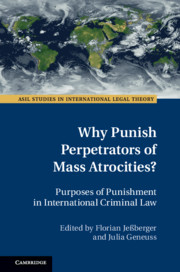Book contents
- Why Punish Perpetrators of Mass Atrocities?
- ASIL Studies in International Legal Theory
- Why Punish Perpetrators of Mass Atrocities?
- Copyright page
- Contents
- Contributors
- Preface
- Abbreviations
- 1 Introduction: The Need for a Robust and Consistent Theory of International Punishment
- 2 The Practical Importance of Theories of Punishment in International Criminal Law
- Part I Setting the Framework: Criminological, Historical and Domestic Perspectives
- 3 Criminology of International Crimes
- 4 Punishment Rationales in International Criminal Jurisprudence
- 5 Punishment and the Domestic Analogy
- 6 Not Much, but Better than Nothing – Purposes of Punishment in International Criminal Law
- 7 The Why Question in International Criminal Punishment – Framing the Landscapes of Asking
- 8 Is International Criminal Law Special?
- Part II Rationales for Punishment in International Criminal Law: Theoretical Perspectives
- Part III Consequences for the Practice of the International Criminal Court
- Select Bibliography
- Index
8 - Is International Criminal Law Special?
A Comment on the Contributions by Frank Neubacher, Sergey Vasiliev and Elies van Sliedregt
from Part I - Setting the Framework: Criminological, Historical and Domestic Perspectives
Published online by Cambridge University Press: 07 February 2020
- Why Punish Perpetrators of Mass Atrocities?
- ASIL Studies in International Legal Theory
- Why Punish Perpetrators of Mass Atrocities?
- Copyright page
- Contents
- Contributors
- Preface
- Abbreviations
- 1 Introduction: The Need for a Robust and Consistent Theory of International Punishment
- 2 The Practical Importance of Theories of Punishment in International Criminal Law
- Part I Setting the Framework: Criminological, Historical and Domestic Perspectives
- 3 Criminology of International Crimes
- 4 Punishment Rationales in International Criminal Jurisprudence
- 5 Punishment and the Domestic Analogy
- 6 Not Much, but Better than Nothing – Purposes of Punishment in International Criminal Law
- 7 The Why Question in International Criminal Punishment – Framing the Landscapes of Asking
- 8 Is International Criminal Law Special?
- Part II Rationales for Punishment in International Criminal Law: Theoretical Perspectives
- Part III Consequences for the Practice of the International Criminal Court
- Select Bibliography
- Index
Summary
Jochen Bung raises doubts as to the distinctiveness of international criminal law. In his view there is no need for specific theories of punishment in international criminal law or to develop specific criminological theories addressing international crimes. Instead, we can draw on what we know from the domestic context. While he agrees that there still is guessing and shadowboxing when it comes to the ‘why punish’ question in international criminal law, he notices that this is equally true when it comes to domestic theories of punishment. What is special though is that international criminal law emerged challenging the classic rules of state sovereignty and non-intervention. For him, this is where the discussion should start, and instead of asking ‘why punish’, we should raise questions such as, Will international criminal law vanish again? Should we hope it will vanish again? Has it helped to establish a collective memory which will prevent us from experiencing future mass atrocities? Is international criminal law a matter for experts and specialists? Is it sufficiently democratic? Is it a sufficiently universal affair? Or is it just another colonial strategy? Can it get less selective? And: Is international criminal law capable of self-criticism?
- Type
- Chapter
- Information
- Why Punish Perpetrators of Mass Atrocities?Purposes of Punishment in International Criminal Law, pp. 129 - 134Publisher: Cambridge University PressPrint publication year: 2020

